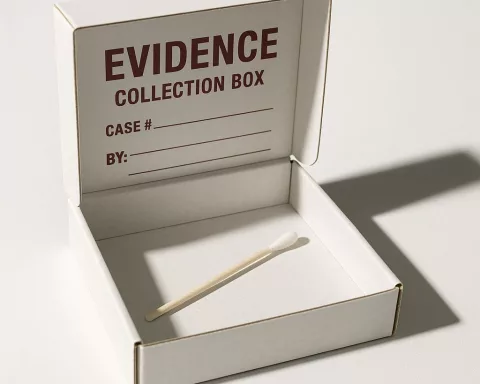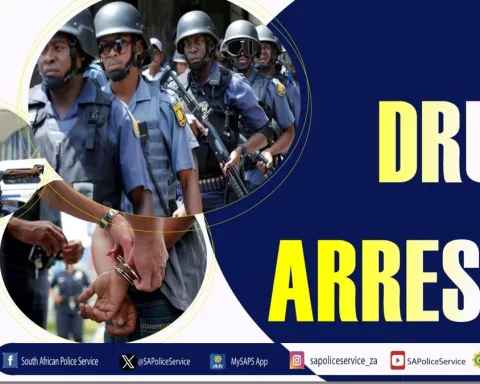A notorious drug lord in Cape Town, Fadwaan Murphy, was recently convicted under the Prevention of Organised Crime Act after a decade-long trial. His drug empire, operating under the label of Ulterior Trading Solutions CC, was uncovered when police found his hidden tik-packaging warehouse, containing drugs and cash estimated to be worth around R4 million. Murphy was sentenced to 18 years in prison and fined R2 million, while all of his properties were to be auctioned. This victory marks a significant win for the legal system in its ongoing struggle against organized crime in Cape Town.
Triumph of Justice in Cape Town: Fadwaan Murphy, a notorious drug lord, was recently convicted under the Prevention of Organised Crime Act after a near-decade-long trial. His criminal empire, operating under the label of Ulterior Trading Solutions CC, was uncovered when police found his hidden tik-packaging warehouse, containing drugs and cash estimated to be worth around R4 million. Murphy was sentenced to 18 years in prison and fined R2 million, while all of his movable and immovable properties were to be auctioned. This victory is a major turning point in Cape Town’s battle against organized crime.
Cape Town, renowned for its stunning beauty, recently played host to a monumental victory of justice. This victory came in the form of a judgement against Fadwaan Murphy, a notorious drug lord in the city, following a near-decade-long trial. This protracted court case signals a significant win for the legal system in its ongoing struggle against organized crime.
Charges Under the Prevention of Organised Crime Act
Murphy and his ex-wife, Shafieka, faced a staggering total of over 200 charges, all under the umbrella of the Prevention of Organised Crime Act (Poca). This marked an inaugural instance of a drug dealer being convicted under this potent, yet rarely invoked, act. The charges ranged from money laundering to direct involvement in drug trade, portraying brutally, a life firmly entrenched in crime.
Unmasking the Concealed Empire
The demise of Murphy’s criminal empire can be traced back to a critical event on 15th September 2015. On this day, the police uncovered his hidden tik-packaging warehouse on Reindeer Street, Lotus River. This discovery was not limited to the warehouse alone; it also included drugs and cash estimated to be worth around R4 million. The confiscated items included nearly 8,000 packets of tik and over 10,000 units of heroin.
Operating under the misleading label of Ulterior Trading Solutions CC, Murphy and his gang, the Dixies, ruled over the Mitchells Plain region. Court records indicate that their influence and operations extended from the warehouse to Worcester, a fact corroborated by incriminating cellphone records presented by the State.
Severe Sentencing and Asset Forfeiture
In a final blow to Murphy’s empire, the 51-year-old kingpin was sentenced to 18 years in prison and fined R2 million. His ex-wife Shafieka was also handed a 15-year prison sentence. Furthermore, the Assets Forfeiture Unit (AFU) auctioned off Murphy’s extensive assets, which included a collection of 14 vehicles and three properties.
The sentences, as outlined by Acting Judge Dianne Davis, were exhaustive and harsh. They included twelve years for Poca, seven years of imprisonment for each of the 139 counts of drug dealing, and one year’s imprisonment for each of the 73 charges of money laundering. Three of Murphy’s properties in Worcester and Lentegeur were linked to counts 223, 224, and 225, and were seized by the AFU as proceeds of his illegal activities.
The most severe punishment, however, came in the form of the confiscation of proceeds from the auctioning of Murphy’s assets. All of Murphy’s movable and immovable properties were to be auctioned, and the revenue garnered would be retained by the Criminal Assets Recovery Account. Murphy’s company, Ulterior Trading Solutions, was additionally fined R2 million.
Community Response and the Fight Against Organized Crime
This remarkable case serves as a testament to the strength of unity within the Cape Town community. Byron de Villiers from the Lentegeur Community Policing Forum expressed his hope that other gangs would not take advantage of this situation to occupy Vet’s stronghold. Raafiqah Ganger from the Lentegeur West Neighbourhood Watch echoed this sentiment, applauding the justice system for its tenacity in handling the case.
However, despite this significant victory, the war against drugs and gangsterism is ongoing. There are indications that drug dealing continues at Fadwaan Murphy’s former property. Members of the community are now demanding information on the remaining properties owned by him. The case is set to continue, with Murphy’s legal team launching an appeal. Regardless of the future developments, one fact remains clear – the conviction of Fadwaan Murphy signifies a major turning point in Cape Town’s battle against organized crime.
1. Who is Fadwaan Murphy and what was he convicted of?
Fadwaan Murphy was a notorious drug lord in Cape Town who was convicted under the Prevention of Organised Crime Act after a near-decade-long trial. He faced over 200 charges, ranging from money laundering to direct involvement in drug trade, and his drug empire operating under the label of Ulterior Trading Solutions CC was uncovered when police found his hidden tik-packaging warehouse containing drugs and cash estimated to be worth around R4 million.
2. What is the Prevention of Organised Crime Act?
The Prevention of Organised Crime Act (Poca) is a potent, yet rarely invoked, act that targets organized crime. Murphy and his ex-wife faced over 200 charges under the umbrella of Poca, making it the inaugural instance of a drug dealer being convicted under this act.
3. How was Murphy’s criminal empire unmasked?
The demise of Murphy’s criminal empire can be traced back to a critical event on 15th September 2015, when the police uncovered his hidden tik-packaging warehouse on Reindeer Street, Lotus River. This discovery was not limited to the warehouse alone; it also included drugs and cash estimated to be worth around R4 million. The confiscated items included nearly 8,000 packets of tik and over 10,000 units of heroin.
4. What was the outcome of Murphy’s trial?
Murphy was sentenced to 18 years in prison and fined R2 million, while all of his movable and immovable properties were to be auctioned. His ex-wife Shafieka was also handed a 15-year prison sentence. The Assets Forfeiture Unit (AFU) auctioned off Murphy’s extensive assets, which included a collection of 14 vehicles and three properties. All of Murphy’s movable and immovable properties were to be auctioned, and the revenue garnered would be retained by the Criminal Assets Recovery Account. Murphy’s company, Ulterior Trading Solutions, was additionally fined R2 million.
5. How did the community respond to Murphy’s conviction?
The community responded positively to Murphy’s conviction, with members expressing their hope that other gangs would not take advantage of the situation to occupy Vet’s stronghold. However, there are indications that drug dealing continues at Fadwaan Murphy’s former property, and members of the community are now demanding information on the remaining properties owned by him.
6. What does Murphy’s conviction signify for Cape Town’s battle against organized crime?
The conviction of Fadwaan Murphy signifies a major turning point in Cape Town’s battle against organized crime. Despite the ongoing war against drugs and gangsterism, this significant victory serves as a testament to the strength of unity within the Cape Town community.












